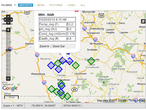
Energy in the developing world
Power to the people
Technology and development: A growing number of initiatives are promoting bottom-up ways to deliver energy to the world’s poor (Sep 2nd 2010)
AROUND 1.5 billion people, or more than a fifth of the world’s population, have no access to electricity, and a billion more have only an unreliable and intermittent supply. Of the people without electricity, 85% live in rural areas or on the fringes of cities. Extending energy grids into these areas is expensive: the United Nations estimates that an average of $35 billion-40 billion a year needs to be invested until 2030 so everyone on the planet can cook, heat and light their premises, and have energy for productive uses such as schooling. On current trends, however, the number of “energy poor” people will barely budge, and 16% of the world’s population will still have no electricity by 2030, according to the International Energy Agency.
But why wait for top-down solutions? Providing energy in a bottom-up way instead has a lot to recommend it. There is no need to wait for politicians or utilities to act. The technology in question, from solar panels to low-energy light-emitting diodes (LEDs), is rapidly falling in price. Local, bottom-up systems may be more sustainable and produce fewer carbon emissions than centralised schemes. In the rich world, in fact, the trend is towards a more flexible system of distributed, sustainable power sources. The developing world has an opportunity to leapfrog the centralised model, just as it leapfrogged fixed-line telecoms and went straight to mobile phones.
Continue reading “Bottom-Up Energy: Wait Not/Rely Not on Government & Industry”




